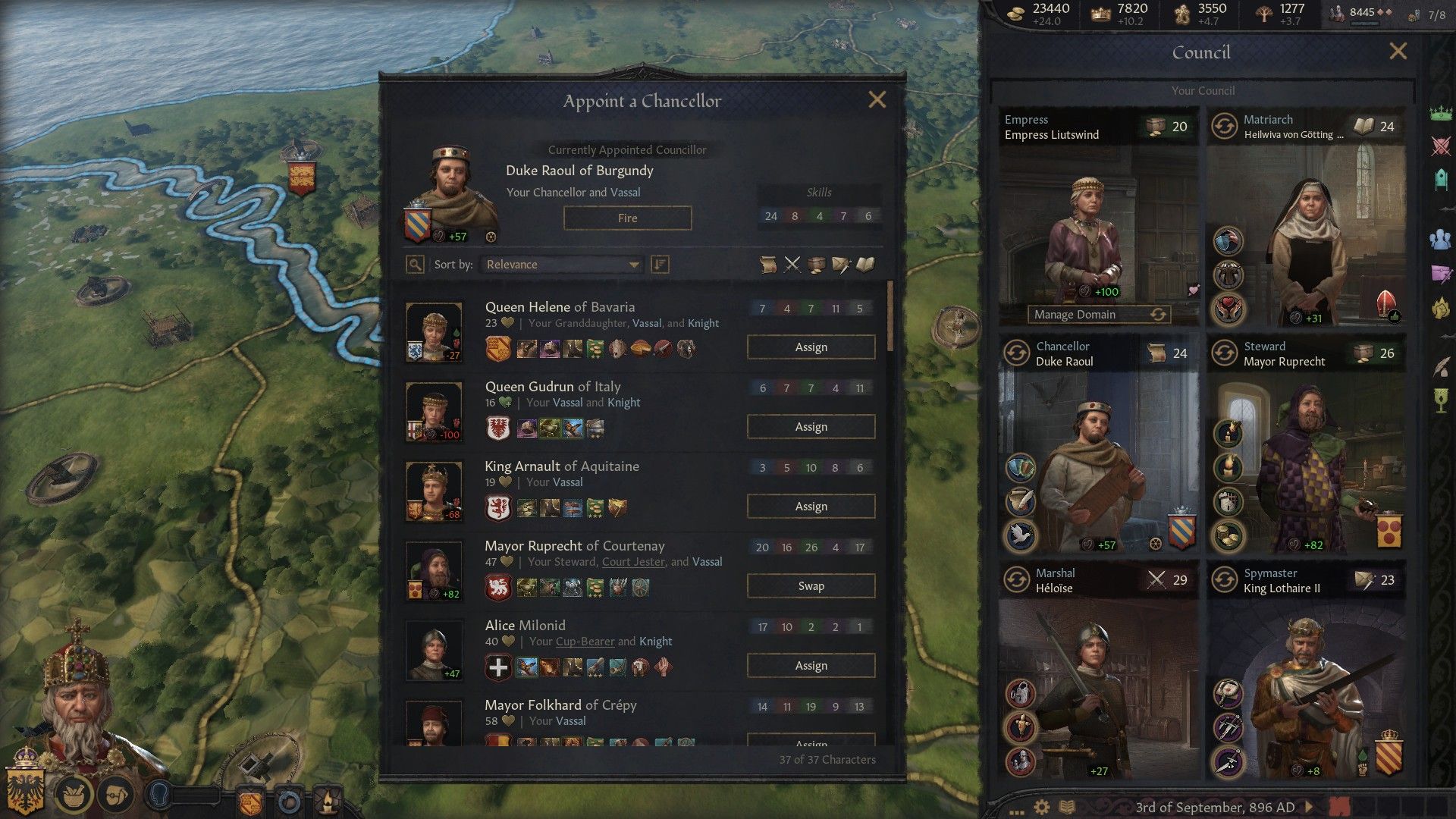The council has been an essential part of the Crusader Kings franchise from the very beginning. The council in Crusader Kings 3 offers a variety of interactions that allow players to modify their realm, armies, court intrigues, and so on, but these interactions are only as effective as their councilors.
The council in Crusader Kings 3 has five regular members, one for each of the game's five skills. It also includes the ruler's spouse, who has a more unofficial role within the council. The best councilors are the ones with lots of skill points to spare, but there are some very good reasons why players may want to give these positions to less competent vassals.
Council Jobs
Players can view their council at any time by selecting the council menu on the right side of the screen. Its symbol is the fancy azure chair just below the military menu.
Every council has five members, although the title of the members sometimes changes based on the ruler's culture. The members are Chancellor (Diplomacy), Marshal (Martial), Steward (Stewardship), Spymaster (Intrigue), and Realm Priest (Learning). The final member of the council is the ruler's spouse, or their "primary" spouse, if their religion or culture allows for multiple spouses.
Each council member has several job types they can perform on behalf of the ruler. Players can switch between these jobs at any time, and they can choose a target if the job needs one. Sometimes a job will have no valid targets, and the option will turn gray, but every council position usually has at least two options that are always available.
While performing these jobs, councilors with a primary stat below 15 have a chance to cause a random negative event, and councilors with a primary stat above 8 have a chance to cause a random positive event. Their stats also have an impact on how effective they are at their job, and this impact scales with their skill level.
Chancellor
The Chancellor represents their liege in interactions with vassals and with foreign leaders.
- Foreign Affairs boosts the Opinions of independent rulers.
- Domestic Affairs boosts the Opinions of direct vassals.
- Integrate Title decreases the time it takes for a duchy or kingdom to enter the ruler's primary realm.
- Bestow Royal Favor(Royal Court expansion only) boosts a specific vassal's Prestige and Opinion.
Marshal
The Marshal organizes and trains their liege's armies.
- Increase Control in County boosts the speed Control goes up in a target county, and it removes Corruption modifiers in the process.
- Train Commanders makes Knights and Men-at-Arms more effective.
- Organize Army increases garrison sizes and decreases the cost of raised armies.
- Manage Royal Guards (Royal Court) boosts Knights and lowers the odds of hostile schemes that target the liege.
Steward
The Steward keeps track of the liege's finances and tax collection agents.
- Promote Culture replaces the Culture of a county with the liege's Culture.
- Increase Development in County slowly increases a county's Development.
- Collect Taxesboosts the liege's total tax revenue.
- Promote Cultural Acceptance boosts the Cultural Acceptance score between the target culture and the liege's culture.
- Convince De Jure Territory (Royal Court) tries to convince a county owner to hand the land over to the county's de jure liege. This can help clean up internal borders without taking on a lot of Tyranny in the process.
Spymaster
The Spymaster looks for hidden threats against their liege, or they assist them with their own Schemes.
- Find Secrets targets a county and has a chance to give their liege a Secret about someone who lives there.
- Support Schemes boost the Hostile Scheme Power and Success Chance of the liege.
- Disrupt Schemes increases the liege's Hostile Scheme Resistance and Discovery Chance.
Realm Priest
The Realm Priest (or Chaplain, or Allamah, etc.) advises the liege on spiritual matters and spreads their Faith across the realm.
- Fabricate Claim on Countyproduces a claim on any county within diplomatic range, and can occasionally produce claims on duchies instead.
- Convert Faith in County will replace the Faith of the target county with the liege's Faith.
- Religious Relations increases Piety per month and can boost the Opinion of Theocratic rulers of the same Faith, including the Head of Faith. If the Faith has the Lay Clergy Doctrine, this instead boosts the Opinion of all same-Faith characters by a smaller amount.
Spouse
The ruler's spouse (or primary spouse) doesn't get jobs like the rest of the council. Instead, they add a portion of their stats directly to the ruler. If players choose the generic "Assist Ruler" job, the spouse will add one-fifth of all their stats to the ruler. If players choose "Court Politics," "Chivalry," "Manage Domain," "Court Intrigue," or "Patronage," the spouse will instead add one-half of one stat to the ruler.
This bonus applies to every test and effect a ruler's stats have on their realm and during random events. Players can see how much a spouse is adding by checking the council menu and clicking their job name in the spouse's box, or by hovering over each of the ruler's stats and looking for the line "Assistance from Spouse."
How to Choose the Best Councilors
There are two things players need to consider when choosing their councilors. The first is obvious: councilor skill. The best councilors are the ones with the highest relevant skill, and players should keep in mind that Crusader Kings 3 only cares about one skill for each councilor. If one candidate for Spymaster has 33 Intrigue but 2 Diplomacy while another candidate has 31 Intrigue and 22 Diplomacy, players should choose the one with 33 Intrigue every time. The Spymaster's Diplomacy has no impact on their job performance.
The second thing to consider is vassal power levels and Opinions. The five most powerful vassals in the realm always want a position on the council, whether they deserve it or not, and they have a -40 Opinion penalty toward their liege if they aren't on the council. Powerful vassals can cause a lot of problems by joining a faction, so keeping them happy may be more important than having someone competent on the council.
What makes this balancing act especially tricky is the Realm Priest position. Many Faiths are Theocratic, which means the religious and secular hierarchies are separate. If this is true, the Realm Priest has to be a Theocratic leader, and Theocratic leaders usually aren't one of a realm's five most powerful vassals. This means players will have no choice but to leave one of their top five vassals off the council (and that assumes player rulers are even allowed to appoint their own Realm Priests).
If the powerful vassals of a realm are happy with their liege, players are free to choose any direct vassal or courtier to be on their council, including any family members who live in the player ruler's court. Players can't choose guests or prisoners for the council, but they can recruit guests and prisoners and then put them to work.
Another issue with the council is Hooks and feudal contracts. Vassals can use Hooks to get themselves positions on the council, and when they do so a player ruler can't remove them for several years. Vassals can also have "Council Rights: Guaranteed" as part of their feudal contract, and this works just like a Hook that gets passed down along with the title. Special rights like this one can sometimes carry over when players usurp a title or vassalize new subjects through a war, so if a vassal suddenly elbows their way onto the council, be sure to check their feudal contract.
If the player ruler isn't an independent ruler, they can end up on their liege's council, either because they have a high skill or because they're too powerful to ignore. Characters get special bonuses for being on a council, and these bonuses scale with the ruler's title level. For instance, a count's Spymaster gets +10 natural Dread, while an emperor's Spymaster gets +40 natural Dread. This makes it useful to join a liege's council even if a player ruler plans on replacing them.
Crusader Kings 3 is available now on PC, PS5, and Xbox Series X/S.






